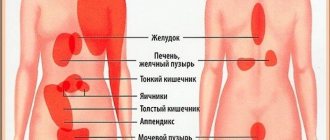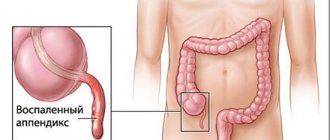Many of us are accustomed to the fact that discomfort felt in the intestinal area necessarily indicates disturbances in the composition of its microflora, and does not pose any danger. However, in fact, discomfort associated with the gastrointestinal tract may indicate various pathological processes. We’ll talk about what causes discomfort in the intestines and what to do in these situations in our article.
Discomfort in the intestines: what to do?
Causes of intestinal discomfort
As you can understand, a variety of diseases and disorders can cause pain inside the most important organ of our digestive system, which:
- are absolutely safe and temporary;
- last a long time and threaten your health, and possibly your life.
In this section of the article we are trying to figure out what causes pain in the intestines.
Poor nutrition and lack of a set meal plan
We are ready to repeat to each of our readers tirelessly: a huge number of diseases affecting the human body are caused by the lack of:
- a properly composed daily menu;
- a clear schedule for eating dishes.
Eat right and it will help avoid intestinal problems
These two missing components actually also involve many nuances. For example, unhealthy diet is, of course, a generalized concept. Let's specify its components:
- consumption of food waste: buns, fast food, heavy meat dishes, sweets and similar food products that are of dubious benefit;
- incorrect content in the daily diet of the amount of substances necessary for the functioning of the body: proteins, carbohydrates and fats;
- refusal to consume a sufficient amount of coarse fiber, which, by the way, has a positive effect on the peristalsis of the muscle tissue of the organ of interest to us;
- Eating too much food is another disorder that makes a person’s overall diet unhealthy;
- lack of sufficient time for eating and chewing, etc.
Unfortunately, all the components of the concept of “improper nutrition” can be listed for quite a long time. Their meaning boils down to the following:
- a person consumes foods that do not provide any benefit;
- food is taken in the wrong portions at the wrong times, etc.
Particularly dangerous today is the trend of replacing nutritious and nutritious meals with their “street” substitute – fast food. This English word stands for “fast food”. Due to flavoring additives, frying in oil, adding sauces, most people find this food unusually pleasant, because our receptors react to every flavor enhancer in it. In addition, the desired food is served in various cafes very quickly.
The more harmful your food is, the more the gastrointestinal tract usually hurts.
The following two categories of people especially abuse hamburgers, potatoes, sweet water and other elements of fast food:
- workers with busy schedules;
- teenagers.
The former usually have short breaks for lunch, therefore, they choose to eat fast food in order to quickly satisfy their hunger and get pleasant emotions from taste impressions.
Teenagers, due to their youthful beliefs, do not consider fast food to be unhealthy food, and prefer to eat it also because of the taste, usually visiting such establishments with a group. As a result, they lose all desire to eat healthy food, which, alas, in terms of the degree of richness of taste, in a sense, cannot compete with harmful ones.
Poor nutrition, among other things, causes “overload” of the gastrointestinal tract, affecting its health not only with the harmful substances contained in the composition, but also with the quantity. As a result, various pathologies can form, including, for example, flatulence, which is guaranteed to cause discomfort in the intestines.
Diseases of the gastrointestinal tract
Unpleasant sensations that seem to arise in the intestines are not always localized there in reality. Each organ of the digestive system is inextricably linked with its other elements, due to which disturbances in one of them will necessarily affect the work of the other.
Diseases of the gastrointestinal tract often cause intestinal discomfort
Let us list the most noticeable pathologies that cause intestinal pain.
Pathology No. 1. Duodenal ulcer is an unpleasant disease in which ulcers (defects that begin to grow and bleed over time) form on the mucous walls of the organ of interest to us. As a result, pain in the intestines accompanies a person every day.
Duodenal ulcer
The causes of ulcers can be different. Most often, damage to the intestinal walls is caused by the bacterium Helicobacter pylori, which enters the body:
- in case of non-compliance with hygiene rules;
- during a kiss;
- when using shared utensils and due to similar factors.
Helicobacter pylori is a bacterium that infects 60% of the world's population
There may be one ulcer in the intestine, but sometimes several open at once. If the disease you are looking for is not treated, it is possible:
- development of peptic ulcer into oncology;
- perforation of the intestine and entry of intestinal contents into the peritoneum;
- the formation of other, no less unpleasant consequences.
At the beginning of the disease, patients, as a rule, begin to feel pain in the left side of the peritoneum, directly near the navel. In this case, the pain will certainly subside if you eat, but the relief does not last long.
Pathology No. 2. Gastritis is a disease that affects the stomach, simultaneously causing defects in the mucous membrane of this organ. From the point of view of unpleasant sensations, a person can rarely distinguish stomach pain from intestinal pain on his own, therefore, he often attributes the pain that occurs to dysbiosis or similar, non-dangerous phenomena.
The most serious and destructive effect of gastritis is on the secretory function of the stomach lining
Gastritis has three forms, divided according to the intensity of damage:
- initial, when the mucous membrane just began to become inflamed and other minor changes occurred;
- medium, when small defects, a kind of ulcer, form on the surface of the inner layer of the stomach;
- the latter, when the ulcers grow, and as a result bleeding begins, which is called “hemorrhagic”.
Most often, the occurrence of this disease is provoked by poor nutrition, prolonged refusal to eat, and other factors similar to those listed.
Pathology No. 3. Chronic pancreatitis is a disease in which there is inflammation of the pancreas, which is not intense. This organ supplies the small intestine with the most important digestive enzymes, without which it is impossible to process food and absorb nutrients from it.
Inflammation of the pancreas feels incredibly painful
The causes of inflammation lie in:
- poor nutrition;
- alcohol abuse.
After, due to the consumption of harmful foods, the outflows leaving the gland, which lead to other organs of the digestive system, are clogged, the enzymes produced by it begin to eat their own “parent”, and they successfully succeed. In fact, the organ slowly digests itself, without sending enough enzymes to other segments of the system.
What does inflammation of the pancreas look like?
The pain that a person experiences at this time can hardly be classified as discomfort, except at the initial stage, since in fact they are very, very noticeable. In addition, they do not have a clear localization, therefore, they make many people think that the problem is in the intestines.
Pathology No. 4. The following is not an intestinal disease, which, nevertheless, causes suspicion among its carriers that it is the organ that interests us that is suffering – cholecystitis. In other words, this is an inflammation of the gallbladder, another neighbor of the intestine located in the peritoneum.
Inflammation itself most often occurs as a reaction to the formation of calculi inside the gallbladder - stones from an enzyme produced by the organ. The more there are, the more obvious the pain symptoms become:
- colic;
- just sharp pains, etc.
Causes of stones
Pathology No. 5. Inflammation of the intestinal mucosa caused by the introduction of any infectious pathogens, for example:
- enteritis;
- colitis, etc.
During inflammatory processes occurring inside the intestines, a person experiences a lot of sensations, some of which even outweigh the pain in terms of the degree of hostility:
- dyspeptic disorders in the form of diarrhea, constipation, vomiting;
- increased body temperature;
- the occurrence of severe headaches;
- apathy;
- flatulence;
- bleeding, etc.
In this case, it should be taken into account that inflammatory processes occur rapidly, so they must also be stopped quickly by contacting a doctor who will help draw up a treatment plan and monitor the further situation.
Pathology No. 6. Dysbiosis, or a violation of the ratio of beneficial and harmful microorganisms in the intestinal microflora, is another reason for the occurrence of unpleasant sensations. Probably every modern person already knows that not only intestinal motility is responsible for the digestion of food, but also its “population” - beneficial bacteria that are actively involved in the process. However, with these beneficial microorganisms in the intestines, harmful ones also live on a permanent basis and enter the body when:
- eating poorly washed food;
- failure to comply with basic hygiene rules;
- under other circumstances.
Unfortunately, if harmful microorganisms enter the intestines in too large quantities or begin to multiply very actively, they can destroy their positive neighbors and damage the process of digestion and absorption of food.
Dysbiosis in the modern world occurs in almost everyone, the main thing to remember is that bacteria can recover on their own, without the additional use of probiotics and other medications
In addition, beneficial bacteria can be killed by taking any medications, for example:
- antibiotics;
- non-steroidal drugs taken to combat inflammation.
However, there is no need to panic. Bacterial colonies are able to recover quite quickly from blows dealt to them. If you want to help them, take for granted a proper nutrition plan and stick to it, and also lean on fermented milk products.
Pathology No. 7. Constant nervous tension can also cause pain in the intestines. Moreover:
- they can be caused precisely by stress, which changes the concentration of natural substances produced by the body that provoke intestinal irritation;
- or may become a consequence of various gastrointestinal diseases, which in turn were formed under the constant influence of psychological stress.
Stressful situations have a direct impact on the functioning of the gastrointestinal tract
Getting rid of pain and discomfort in the intestines in both cases will be very difficult, since the issue will have to be approached comprehensively, and in addition to drugs for the treatment of the gastrointestinal tract, do the following:
- start drinking sedative herbal preparations or medications with a similar effect, if you cannot do without them;
- go to a psychologist who will help relieve accumulated stress and determine a further plan of action;
- in especially severe cases, you need to change jobs or replace another subject of your stress;
- take a vacation and get a good night's sleep;
- workout.
Pathology No. 8. Irritable bowel syndrome is a disease that affects a really large number of people today. To date, medicine has not given it a complete explanation.
Irritable bowel syndrome causes not only diarrhea or constipation, but also flatulence, bloating and other misfortunes
The intestines are in an irritated state almost constantly, causing such unpleasant consequences as:
- diarrhea;
- constipation;
- flatulence;
- pain;
- bloating.
The causes of this irritation may be the following factors:
- mental stress;
- diseases of the reproductive system;
- endocrine disorders;
- low mobility during the day;
- eating disorders, etc.
Increased intestinal sensitivity in each case is individually discussed, examined, and eliminated with the help of a medical specialist. Self-treatment usually does not lead to calm, but, on the contrary, to increased discomfort in the intestines.
Pathology No. 9. Other reasons not related to diseases of the gastrointestinal tract can affect the formation of discomfort in the intestines. Often these sensations arise, for example, during pregnancy, when the fetus growing in the uterus puts pressure on the organs; in addition, the hormonal background changes, and all processes occurring in the body are rearranged. In this case, the discomfort is still temporary, however, the expectant mother should discuss this issue with her doctor.
Pregnancy may cause intestinal discomfort
Treatment
Irritable bowel syndrome is influenced by a complex of factors, and treatment should compensate for this and eliminate the main symptoms. For successful therapy, cooperation between the doctor and the patient, the patient’s participation in treatment, and his motivation to overcome both psycho-emotional and physiological problems are important. Psychotherapy, diet therapy, and medications can be used for treatment. The doctor chooses treatment methods, taking into account which factors most influence the manifestations of the syndrome. They also take into account the patient’s health characteristics, the duration of the disease, and how exactly the syndrome manifests itself.
Medications
Medicines are chosen according to the set of symptoms:
- for diarrhea, medications that are enveloping, astringent, and reduce intestinal motility are prescribed to normalize peristalsis;
- for constipation, use herbal laxatives, osmotic saline solutions, and other drugs that enhance peristalsis;
- for flatulence, prokinetics and antispasmodics are used to normalize peristalsis;
- Antispasmodics are prescribed to relieve pain.
For severe emotional disorders (anxiety or excitability, neurasthenia, depression), antidepressants or sedatives may be additionally prescribed.
Important! Only a doctor can prescribe medications, give recommendations on their use, and set dosages after confirming the diagnosis. Self-medication can be dangerous, make you feel worse, and make diagnosis difficult.
Psychotherapy
If the onset of symptoms of irritable bowel syndrome is associated with stress, emotional tension, or anxiety, psychotherapy can help solve the problem. Cognitive behavioral therapy is most often used. Usually this is a short-term treatment that helps to correct behavior, emotional response, thoughts, and existing attitudes. Less commonly, hypnosuggestive therapy, neurolinguistic programming, or other therapeutic techniques may be used.
Important! Before contacting a psychotherapist, you need to be examined by a therapist or gastroenterologist. It is necessary to make sure that the symptoms that arise are associated specifically with irritable bowel syndrome and not with other diseases.
Diet
Patients with irritable bowel syndrome are advised to follow the principles of a healthy diet:
- the diet should be balanced;
- It is better to eat in small portions, slowly;
- if you have bloating, avoid foods that provoke flatulence (legumes, cabbage, other foods high in fermentable fiber);
- reduce the consumption of sweeteners, sugar, fructose to reduce the risk of diarrhea and flatulence;
- To combat constipation, dietary fiber-containing dietary supplements are used.
When creating a nutrition plan to reduce the symptoms of irritable bowel syndrome, prepared diets can be used. The most commonly recommended diet is the Low-FODMAP diet. This is a diet of foods containing a minimum of FODMAP substances (so-called short-chain carbohydrates). Such substances include:
- oligosaccharides (found in rye, wheat, legumes, soy products, garlic, onions);
- disaccharides (found in dairy products);
- monosaccharides (fructose);
- polyols (found in plums, peaches, mushrooms, cauliflower).
Eliminating foods containing FODMAPs may reduce diarrhea and flatulence, but this diet may not be effective for all patients. If its use does not produce results, you should abandon it. A gluten-free diet can also be used to reduce the symptoms of irritable bowel syndrome. It is better to formulate a suitable diet together with your doctor after the examination.
Figure 1. Example of a food table for the FODMAP diet. Source: medicalnewstoday.com
Discomfort in the intestines: what to do?
If you feel discomfort in your intestines that bothers you, go to the hospital and make an appointment with a doctor. Of course, you will have to undergo some diagnostic tests to identify the causes of pain. These events include:
- bacteriological examination of stool;
- a coprogram that allows you to diagnose diseases of any gastrointestinal tract;
- Often it is also necessary to undergo an examination using an endoscope, which enters the intestine through the anus, with the help of which a visual inspection of the inside of the organ of interest to us is carried out.
The doctor will determine a specific treatment regimen after a specific pathology is discovered. At this stage, when you just feel unpleasant pain in the peritoneum, it is impossible to draw conclusions and talk about specific drugs, since as a result, the disease that affects your body can have a very different etiology.
The simplest thing you can do at home is:
- relieve symptoms (only if you visit a doctor);
- switch to dietary nutrition;
- restore drinking regime;
- rest more;
- avoid stress.
At home, you can stick to a diet and restore your drinking regime
Take your temperature and notice if pain appears elsewhere. This is necessary to talk with a doctor, who will definitely ask about the symptoms that are preventing you from living in a normal rhythm of life.
Diagnostics
To correctly determine the causes of intestinal damage, it is necessary to undergo a thorough examination. In this case, you should contact not only a therapist, but also a gastroenterologist and nutritionist. Diagnostics involves the following procedures:
- Questioning the patient to find out the symptoms, the nature of the sensations, the duration of the pain, as well as possible causes of discomfort.
- Stool analysis. With its help, you can determine not only the presence of parasites in humans, but also the composition of enzymes. If their quantity is insufficient, then flatulence and a feeling of discomfort inside the intestines may appear.
- Colonoscopy. The condition of the organ is examined using a miniature video camera.
- FGDS - swallowing a hose with a camera. Thanks to this procedure, although it is very unpleasant, you can carefully examine the surface of the stomach for the presence of ulcers, wounds, and perforations.
- Endoscopic examination. It is prescribed to the patient quite rarely. An endoscope is needed only if persistent discomfort in the intestinal area is caused by cancer.
If the discomfort is supplemented by severe pain in the lower abdomen, the patient feels nauseous and vomits for no reason, or the temperature rises, it is necessary to urgently call a doctor. At the same time, self-medication is strictly prohibited.
Interesting! Why did a woman develop distension in the lower abdomen????
Let's sum it up
Discomfort in the intestines rarely manifests itself alone; it is usually accompanied by a fairly impressive list of concomitant symptoms. It is most often impossible to figure out on your own what disease is tormenting you.
If discomfort occurs, do not panic and go to the doctor
Place this work on the shoulders of specialists - doctors. The effectiveness of the drugs they select will be much higher than those whose names you read on the Internet. Be sure that in this way you do not shift responsibility from yourself and do not lose control over the situation; on the contrary, you allow it to be resolved safely and in the shortest possible time. What is a sphincter, you will find the answer in the link.











